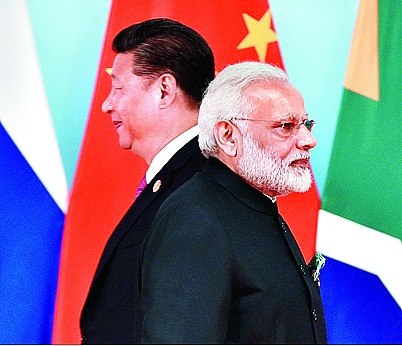
FROM CHANAKYA TO MODI: EVOLUTION OF INDIA'S FOREIGN POLICY By Aparna Pande, HarperCollins, Rs 599
The ten-week-long military standoff at Doklam between India and China was resolved just in the nick of time. Had the face-off dragged on for a few more days, it would have put in peril the latter's plan of hosting a successful BRICS summit at Xiamen. Now Beijing might be in denial and trying to hide its embarrassment by taking recourse to shrill rhetoric - the Chinese foreign minister, Wang Yi, has asked India to "learn lessons" from Doklam - but there is a general consensus among experts on international relations that this round surely went to New Delhi. The Indian prime minister, Narendra Modi, has added a few more inches to his stature, both at home and abroad, by standing up to threats from the country that the veteran American senator, John McCain, pithily described as the "bully" in Asia. The performance of a government in the arena of international politics is, therefore, an important factor in determining its reputation.
However, not even the most talented foreign policy teams can consistently guarantee the best possible outcome. The bargaining power of a nation is also influenced by the economic and strategic resources at its disposal. The lack of these resources was the reason behind India's inability to play a decisive role in world affairs in the immediate post-Independence years. Surprisingly, Aparna Pande, in her new book, From Chanakya to Modi: Evolution of India's Foreign Policy, makes this point in a rather nonchalant manner.
For a work that attempts to traverse a wide swathe of time, as is evident from the title, Pande's book is rather slim. This, in part, is owing to the fact that the author quickly moves to a discussion on the legacies of the raj and the founding fathers of modern India after a brief evaluation of the impact of Kautilyan thought on Indian foreign policy.
Pande seems to be enamoured of the first prime minister of India, Jawaharlal Nehru, whom she affectionately terms an "international nanny". But then, one may ask, who isn't? Even the most bitter critic of Pandit ji would agree that there is no way to ignore Nehru while talking about the evolution of the country's foreign policy. More than half a century after his death, Nehru's ideas continue to shape India's interactions with the world. For instance, New Delhi is still uncomfortable joining military alliances, just as it was during Nehru's days. According to Pande, the only other prime minister who comes close to matching Nehru's zeal on matters of international diplomacy is the current occupant of the executive office.
It may appear a tad unusual to some that the reviewer has not yet talked about the role played by the ministers of external affairs. But that is because Pande thinks they do not really matter in the formulation of foreign policy. Starting with Nehru, the author avers, most prime ministers, with varying degrees of success, have tried to put their own stamp on the foreign policy measures undertaken by their governments. One exception being V.P. Singh, who had "little knowledge or interest in external affairs".
From Chanakya to Modi also lists the principles and the institutions that guide the makers of India's external relations - an example would be the 'Indira Doctrine' that leads New Delhi to view the subcontinent as its own backyard. India discourages external powers from getting involved in the region.
In the final analysis, it can be said that Pande has written a good introductory book for students of political science. However, one fears that this volume would not appeal to readers who do not belong to the discipline. The drama and intrigue associated with international relations attract lay readers, but Pande has steadfastly desisted from spicing things up.










